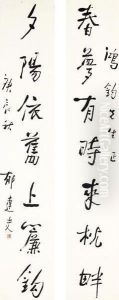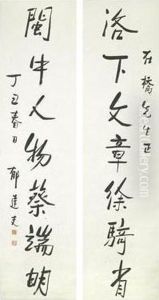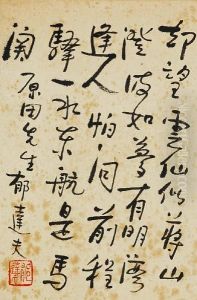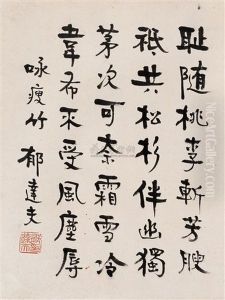Yu Dafu Paintings
Yu Dafu was a prominent Chinese writer and poet, best known for his contribution to modern Chinese literature. Born on December 7, 1896, in Fuyang, Zhejiang Province, China, Yu Dafu emerged as a significant figure in the literary scene during the early 20th century, a period marked by political upheaval and cultural transformation in China. His literary career is often associated with the exploration of personal emotions and the critique of societal issues, themes that resonated with the intellectual youth of his time.
Yu Dafu's education played a crucial role in shaping his literary style and thematic concerns. He studied in Japan from 1913 to 1922, an experience that profoundly influenced his worldview and his writing. His exposure to Western literature and thought, combined with his deep-rooted connection to Chinese literary traditions, allowed him to develop a unique narrative style characterized by lyrical prose and introspective depth. Yu Dafu's most famous work, 'Sinking' ('Chenlun'), published in 1921, is a poignant exploration of the feelings of despair and alienation experienced by a Chinese intellectual living in Japan. The story's explicit depiction of sexuality and its critique of social and national identity issues were groundbreaking at the time, eliciting both acclaim and controversy.
Throughout the 1920s and 1930s, Yu Dafu continued to produce a prolific body of work, including short stories, essays, and poems that dealt with a variety of themes, from romantic love to national salvation. His writing often reflected his personal struggles with depression and his sense of isolation, both as an intellectual in a society undergoing rapid change and as an individual facing personal demons. Despite his personal turmoil, Yu Dafu was an active participant in China's literary circles and was a founding member of the Creation Society (Chuangzao She), a group that sought to promote modern Chinese literature and arts through the adoption of Western styles and themes.
Yu Dafu's later years were marked by the Sino-Japanese War and the subsequent turmoil in China. His writings during this period reflected a growing concern for his country's fate and a deepening sense of nationalism. Unfortunately, Yu Dafu's life came to a tragic end when he died under obscure circumstances in Sumatra, Indonesia, in September 1945, just as World War II was coming to a close. Despite his untimely death, Yu Dafu's work has continued to be celebrated for its profound emotional depth and its critical engagement with the issues of modernity, identity, and nationhood. His legacy endures as a testament to the power of literature to address the most pressing concerns of the human condition.





